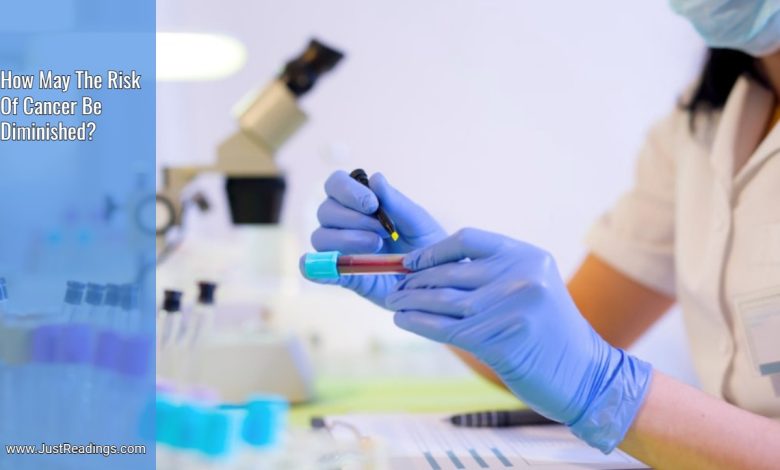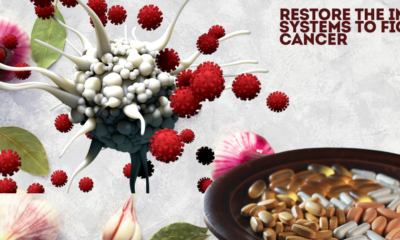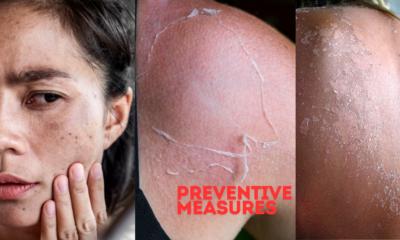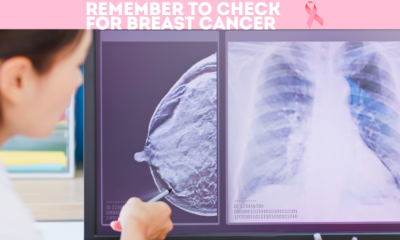Health & Fitness
How May The Risk Of Cancer Be Diminished?

Cancer is one of the leading causes of death in the world, and it can have devastating effects on both individuals and their families. But what are some of the causes of cancer, and how can we reduce the risk of getting it? In this blog post, we will discuss what causes cancer and how we can take steps to prevent it. We will also look at the role of early detection and how it can help us reduce our risk. By the end of this post, you should have a better understanding of the steps we can take to reduce the risk of getting cancer.
Read To Learn More Info: selon un rapport
What Are The Causes Of Cancer?
When we think of cancer, most of us envision someone who has the disease and is fighting for their life. However, cancer can happen to anyone at any time, regardless of age or health. The good news is that there are many ways to prevent cancer from happening, and once it has started, there are many ways to treat it. Below, we will outline some key points that you need to know about the causes of cancer.
Understanding the Causes of Cancer
There is no one answer to this question, as different cancers have different causes. However, some key factors that are associated with cancer include: smoking cigarettes, being overweight or obese, having a diet high in processed foods and unhealthy fats, being exposed to environmental radiation (such as from x-rays or CT scans), and having a family history of the disease.
Identifying Potential Risk Factors
While not all risk factors will lead to cancer development in every person, knowing which ones might increase your risk is important for two reasons: firstly, it allows you to make adjustments in your lifestyle in order to lower your risk; and secondly, it allows you to receive early medical attention if you start showing any signs or symptoms of cancer. Some potential risk factors for developing cancer include: being age 50 or older; having a family history of breast or ovarian cancer; experiencing menopause; having a personal history of chronic inflammation; carrying certain genetic mutations; drinking alcohol heavily; using cruciferous vegetables (such as broccoli) regularly; and using large amounts of sunscreen.
Following Healthy Lifestyle Habits
It’s important not only to identify which risks contribute towards developing cancer, but also how best to reduce those risks. Following healthy lifestyle habits can help reduce your risk of developing various cancers by up to 90%. Some key lifestyle habits that protect against cancers include: avoiding smoking cigarettes; maintaining a healthy weight by avoiding excessive weight gain and obesity; eating a balanced diet with plenty of fruits and vegetables; regularly getting adequate physical activity; following safe sun exposure guidelines; limiting exposure to hazardous materials. In addition, increasing intakeof whole grains, fruits, and vegetables helps reduce the risk for chronic diseases such as heart disease, stroke, type 2 diabetes, certain typesof breastcancer. And lastly receiving regular screenings for all typesof cancers can help identify precancerous lesions before they turn into full-blown tumors.
How Can We Prevent Cancer Risk?
It’s no secret that cancer is the number one cause of death in the United States. Each year, it kills more people than heart disease, pneumonia, and stroke combined. In fact, cancer is now the leading cause of death for men and women in the United States. While there is no cure for cancer, there are many ways that you can reduce your risk of developing the disease. Below, we’ll outline some key lifestyle changes that you should make to help prevent cancer risk.
First and foremost, maintain a healthy lifestyle. This means eating a balanced diet rich in fruits and vegetables as well as whole grains, low in sugar and processed foods, and taking care not to over-indulge in unhealthy snacks or drinks. It’s also important to get plenty of exercise – even just 30 minutes a day can have positive effects on your overall health.
When it comes to avoiding harmful chemicals exposure, take proper precautions by using protective gear when working with hazardous materials or using paints or other products that contain harmful chemicals. Additionally, avoid smoking cigarettes and drinking alcohol excessively – both of which increase your risk of developing cancer later on in life. Finally, make sure to get recommended vaccinations and medical screenings – both of which can help protect you from various diseases and cancers down the road.
To further boost your immune system health, make sure to include regular supplements such as vitamins C and E as well as probiotics into your diet plan. And finally reduce exposure to environmental toxins such as air pollution, radiation from appliances or cell phones (especially if you’re carrying a RFID chip), and other industrial chemicals found throughout our everyday lives by limiting time spent outdoors during peak hours or using air filters at home when possible。.
Can Early Detection Help Reduce Cancer Risk?
When it comes to cancer, prevention is always the best policy. That’s why it’s important to understand the common cancer risk factors and to get screenings and exams as often as possible. By doing this, you may be able to detect symptoms in their early stages and reduce your risk of developing cancer.
One of the most important things that you can do for your health is to maintain a healthy lifestyle. This includes avoiding tobacco use, excessive alcohol consumption, and sun exposure. These habits can increase your risk of developing certain cancers, including breast cancer. Additionally, eating a nutritious diet and getting plenty of exercise can help reduce your risk of developing other types of cancers.
If you have family history of cancer or are at an increased risk for developing the disease, talk to your healthcare provider about screening recommendations specific to you. They will be able to help make sure that you’re getting all the information that you need about screenings and exams so that you can make an informed decision about whether or not they are right for you.
Finally, be sure to stay up-to-date on the latest cancer research findings so that you can make informed decisions about how best to protect yourself from this deadly disease.
Understanding The Benefits Of Early Cancer Detection
Cancer is a major cause of death in the United States, and it’s one of the leading causes of disability. Due to this, it’s important to be aware of all the benefits that early cancer detection can offer. By detecting and diagnosing cancer early, you can allow for more effective treatments that may lead to a longer and healthier life. In this section, we will outline some of the key benefits of early cancer detection.
First and foremost, detecting and diagnosing cancer is a key component of overall health. By catching cancer as soon as possible, you can potentially avoid more serious consequences down the road. Furthermore, by catching cancer at an early stage, you may be able to receive better treatment options that could save your life. While many people think of genetic testing or screening when they think about early cancer detection, there are many other ways to detect cancers early on. For example, eating healthy foods and exercising regularly can help reduce your risk of developing certain cancers. Additionally, avoiding tobacco smoke and staying protected from sunlight can also help reduce your risk of skin cancer.
More details: 5 Treatments For Epilepsy
Another important benefit of early detection is that it allows for more effective treatments. If you catch cancer at an earlier stage than it has progressed too far growth may be possible with traditional treatments such as surgery or chemotherapy drugs. Additionally, genetic testing and screening can identify individuals who are at higher risk for developing certain cancers – meaning that they might not even know they have the condition until it’s too late! Advanced imaging technologies such as MRI or CT scans can also be used to detect tumors before they become apparent to the naked eye – meaning that you could potentially save someone’s life by finding out about their tumor sooner rather than later!
Finally, knowing your family medical history is important when it comes to detecting cancers Early-On because some conditions are associated with an increased risk for particular types cancers including hereditary conditions like Lynch syndrome or BRCA1/2 mutations which increase breast or ovarian cancer risks respectively Marie-Josée Kravis (2018), The Role Genetics Plays in Cancer: What You Should Know About Hereditary Breast Cancer, WebMD. Knowing about these conditions allows you to make informed decisions about your health including whether or not you choose to have children who might inherit a condition associated with increased risk forcancer development.
In Conclusion
By understanding the causes of cancer and identifying potential risk factors for developing it, we can take steps to reduce our risk. This includes following a healthy lifestyle, avoiding exposure to hazardous materials, increasing intake of whole grains, fruits, and vegetables, and receiving regular screenings. Early detection is also an important part of reducing cancer risk, as it can help us receive better treatments that may lead to a longer and healthier life. Taking these preventive measures is key in protecting ourselves against this deadly disease.
-

 Business6 days ago
Business6 days agoS&P 500 Soars in Best May in Decades Amid Tariff Relief and Nvidia’s Surge
-

 Immigration6 days ago
Immigration6 days agoTrump’s Immigration Crackdown: Legal Battles and Policy Shifts
-

 Business6 days ago
Business6 days agoUS Stock Market Soars in May Amidst Tariff Tensions and Inflation Worries
-

 Government6 days ago
Government6 days agoTrump Administration’s Government Reshaping Efforts Face Criticism and Legal Battles
-

 Business6 days ago
Business6 days agoTrump’s Tariffs: A Global Economic Reckoning
-

 Foreign Policy4 days ago
Foreign Policy4 days agoInside Schedule F: Will Trump’s Federal Workforce Shake-Up Undermine Democracy?
-

 Press Release3 days ago
Press Release3 days agoIn2space Launches Campaign to Make Space Travel Accessible for All
























